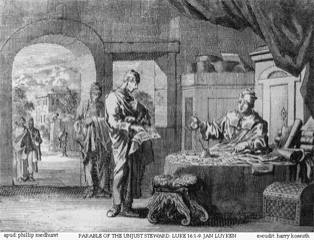Sunday Reflection with Canon Robin Gibbons: 21 September 2025

Parable of the Unjust Steward by Jan luyken (17th century etching)
I thought I'd divide my reflection into two parts. The first is simply part of our preparation for reflecting on the parable of today's gospel, found in Luke 16: The unjust steward. It is a slightly complicated story!
So, the first stage is easy, to enable ourselves to hear the Word, and let its two-edged sword cut deep into our heart, soul and minds; we need to pray. This is what Paul is asking us to do in our second reading from I Timothy 2. Prayer is not the preserve of clergy or religious; it is the gift that keeps on giving and the vocation of each and every Christian.
Nobody has a monopoly on prayer and nobody should claim that the prayers of any one person are more powerful than anyone else. After all, if we know our Scriptures, we are well aware it is often the short sharp heartfelt prayer of the poor, the outcast, the widowed and orphaned or those persecuted - in fact often the very least - whose prayer is heard and answered in direct ways. Remember it isn't length of prayer or amount of words but that prerequisite of a humble and contrite heart.
Later on, in another reflection we can examine the types and ways of prayer, the different methods that have been given to us by good women and men, tried and tested down the centuries. Yet, always, it seems the simplest are perhaps the best - for instance that deep prayer of the whole self, the Jesus Prayer is perhaps my favourite, alongside a methodical dwelling on the Our Father, the prayer Jesus taught us! You will have your own ways! Meanwhile, in 1 Timothy Paul gives us the germ of real praying when he writes: "First of all, then, I ask that supplications, prayers, petitions, and thanksgivings be offered for everyone"(I Tim 2:1). Scattered in this sentence are types of praying, Paul sees them as one whole. That translation of 'First of all' does not completely describe what is meant, more appropriately it could read, 'above all' or 'most importantly', a prelude to his insistence that we pray persistently and in these ways: by entreaty or an appeal for a particular need, by general prayer ( often petitionary) addressed to God-proseuche, by entreaty in a bold direct manner, and lastly by eucharistia which denotes an expression of gratitude( familiar to us the the Great prayer of the Eucharist).
These then are the types of prayer we need to use, so perhaps as we approach today's gospel we might ask for the gift of perception so as to understand by the help of the Spirit the gift of the good news! And reception, that we may be receptive to, and make the words our own. And finally gratitude for the gift of the good news of salvation.
The parable of the dishonest steward
Here is a manager of a large estate whose dealings have been less than honest and who has been found out by the rich owner so that he now faces the sack. This has quite a contemporary feel about it, quite frequently this type of white collar crime appears in our media, to the delight of the gossip columnists. Except that there are real consequences for the innocent, tradespeople, investors, those further down the line the debtors, about to lose everything. It is the same here in Luke's story; the Steward has been found out and is now about to face the consequences of his wrong doing! So far so good, but then things take a different turn. The Steward goes around to all the people who owe his employer money and in a show of real (and calculated) generosity reduces their debts. He does this not out of any altruism, but for a purely selfish motive so that they remember his 'generosity' and will then be hospitable to him after he loses his job.
What comes next is a total surprise. Far from sacking him, or castigating him for his sinful actions, the man is let off with a commendation for being astute and feathering his nest, so to speak!
Why does Jesus do this, what does it mean, surely not an acceptance of evil and bad practice? The steward does not repent nor does he act in a virtuous manner, yet the rich man commends his behaviour. It might help us a little as we remind ourselves that this parable comes in between the parable of the 'Prodigal Son (chapter 15) and the rich man and Lazarus (chapter 16). They can help us a little, firstly by comparison. The Steward squanders property that is not his, just like the younger son, and in a twist he is restored to his position by a rich man who, slightly like the Father, welcomes him back, but maybe with an eye on the main chance for using him to increase his future wealth. The rich man in the story of Lazarus ends up in Hades, whilst the mistreated Lazarus ends up in Heaven. So what of our steward's actions and the master's response?
Firstly, we must not spiritualise this passage too much. It has relevance for our own lives and actions; we have to become as wise as the children of this world, be a bit more realistic in our approach to life, learn from what we can term the 'prudence' of the steward who seeing how things might work out and 'prudently' wins himself friends who will cushion his fall from grace.
Secondly, the dubious behaviour of the steward by remittance of his master's debtors is in actual fact a sign of redemption and renewed friendship between both steward AND master with those debtors, because it will engender reciprocity and inner gratitude between them - what Jesus describes as making 'friends for yourselves with dishonest wealth'(Lk15:9a). It might not be a thoroughly good act, but it has very good consequences!
Thirdly, there is the connection to our dealings with others. The steward reminds me of how necessary it is to occasionally turn things upside down, take the risk to do something for others that may be very misunderstood. Jesus does not call us to be safe, rather he calls us to be shrewd for the Kingdom, to put others' needs and necessities, their integrity and human rights, first.
Fourthly, the parable challenges us to review our own motives and actions. No matter however much we may think it possible, it is true as Jesus says: "No servant can serve two masters. He will either hate one and love the other, or be devoted to one and despise the other. You cannot serve God and mammon"( Lk 16:13). Yes, we need the necessities of life , we need jobs and homes, we need the security of peace. That is part of our calling to work towards equity for people, caring for those unable to do so for themselves, by respecting creation and its needs but also by our shrewdness in using situations for our own and others 'good advantage'. But at the heart of our calling is that call of God to tread lightly and carry gently the things of this world; for the reign of God and the Kingdom we seek demands we understand wealth and power are gifts from God to be used wisely and well for others.
Lastly, are we like the steward? Well yes, I suppose we are; like him we are still sinners. But can we - like him - begin to change, to transform bad circumstances into good and positive happenings? Are we able to reach out and form new friendships by forgiving our debtors? Are we like the steward, prepared to use God's wealth wisely for the sake of the Kingdom and serve with our sisters and brothers the one who cares for us all?
Lectio
Lk 16:13 lays down the rule that no slave can serve two masters. The master possessed the slave and possessed him exclusively. Nowadays, a servant or a workman can quite easily do two jobs and work for two people. They can do one job in their working time and another in their spare time. They can, for instance, be a clerk by day and a musician by night. Many a person augments their income or finds their real interest in a spare-time occupation. But a slave had no spare time; every moment of their day, and every ounce of their energy, belonged to the master. They had no time which was their own. So, serving God can never be a part-time or a spare-time job. Once a person chooses to serve God, every moment of their time and every atom of their energy belongs to God. God is the most exclusive of masters. We either belong to God totally or not at all.
Pope Paul VI: Populorum Progressio
47. But these efforts, as well as public and private allocations of gifts, loans and investments, are not enough. It is not just a question of eliminating hunger and reducing poverty. It is not just a question of fighting wretched conditions, though this is an urgent and necessary task. It involves building a human community where men can live truly human lives, free from discrimination on account of race, religion or nationality, free from servitude to other men or to natural forces which they cannot yet control satisfactorily. It involves building a human community where liberty is not an idle word, where the needy Lazarus can sit down with the rich man at the same banquet table. (52)
On the part of the rich man, it calls for great generosity, willing sacrifice and diligent effort. Each man must examine his conscience, which sounds a new call in our present times. Is he prepared to support, at his own expense, projects and undertakings designed to help the needy? Is he prepared to pay higher taxes so that public authorities may expand their efforts in the work of development? Is he prepared to pay more for imported goods, so that the foreign producer may make a fairer profit? Is he prepared to emigrate from his homeland if necessary, and if he is young, in order to help the emerging nations?


















